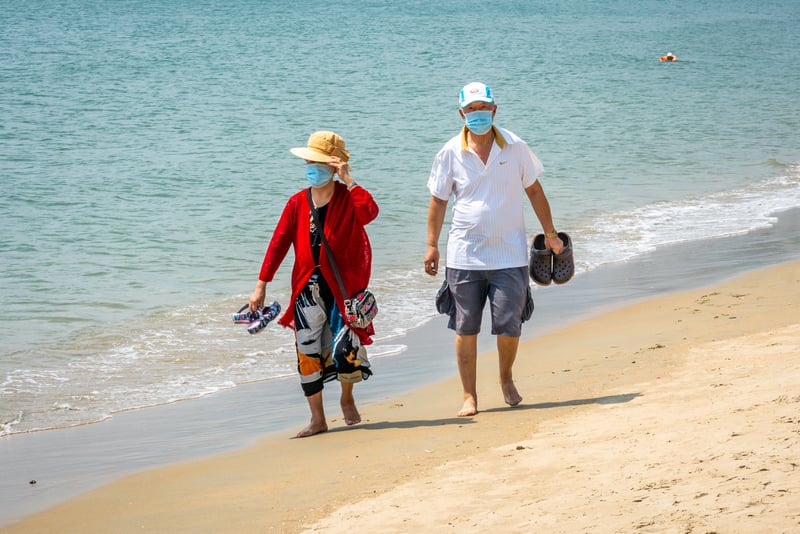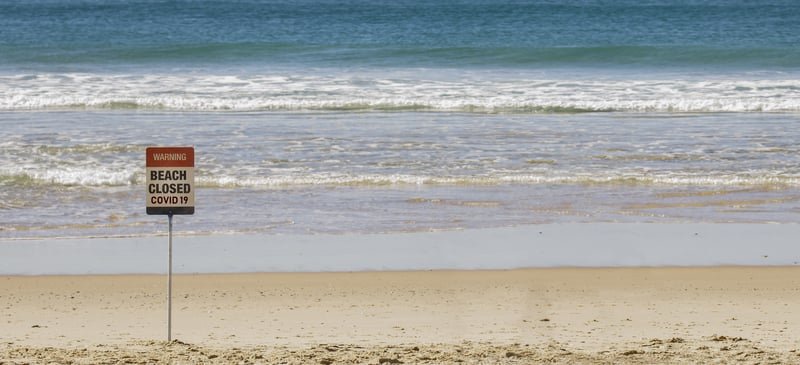TRENTON, NJ—As we embark on the five-year anniversary of the COVID-19 pandemic and the subsequent ridiculous response by local governments, especially in New Jersey, let’s take a trip down memory lane.
During the COVID-19 pandemic, local governments around the world implemented a wide range of measures to limit the spread of the virus, some of which were unusual, extreme, or widely criticized. Below is a list of 10 of the craziest or most notable actions taken by local governments to keep people from going outside or to enforce restrictions, based on available information and sentiment reflected in various sources:
Filling Skate Parks with Sand (California, USA)

In cities like Los Angeles and San Clemente, authorities dumped tons of sand into public skate parks to prevent skateboarders from gathering. The move was intended to discourage outdoor recreation but frustrated locals who saw it as excessive, especially since outdoor activities were generally considered low-risk.
Shooting Paintballs at Curfew Breakers (Minneapolis, USA)
During the 2020 lockdowns, Minneapolis police, under Governor Tim Walz’s administration, reportedly fired paintballs at residents sitting on their porches after curfew. This was part of enforcing stay-at-home orders and sparked outrage for its aggressive approach to a minor infraction.
Arresting Solo Paddleboarders (Malibu, USA)

In California, a man paddleboarding alone in the ocean was chased down by lifeguards and arrested for violating beach closures. The incident drew attention for targeting an individual in an isolated, outdoor setting where transmission risk was negligible.
Drone Surveillance and Public Shaming (New York City, USA)
New York City deployed drones to monitor parks and public spaces, with some broadcasting messages to shame people into dispersing. For example, drones in the East Village reportedly scolded residents for not following social distancing rules, creating a dystopian atmosphere.
Welding Apartment Doors Shut (Wuhan, China)
In the early days of the outbreak, reports emerged from Wuhan of local officials welding shut the doors of apartment buildings to enforce strict quarantines. This extreme measure trapped residents inside, raising human rights concerns and amplifying fears of government overreach.
Banning Dog Walking Without a Mask (Minneapolis, USA)

In Minneapolis, authorities reportedly threatened fines for walking dogs without wearing a mask, even in uncrowded outdoor areas. This hyper-strict enforcement of mask rules frustrated residents who saw it as unnecessary for solitary activities.
Closing Parks and Beaches Despite Low Risk (Various Locations, USA)
Many local governments, such as those in California and Florida, closed public parks and beaches entirely, even taping off playgrounds or posting guards. Critics argued this defied evidence that outdoor transmission was rare, especially in open, ventilated spaces.
Put COVID-19 Elderly Patients in Full Nursing Homes (New Jersey/New York)
New York Governor Mario Cuomo and New Jersey Governor Phil Murphy ordered COVID-19 positive elderly patients to return to their nursing homes, leading to the deaths of possibly thousands of others.
In Madrid, local police patrolled the streets at night, blowing whistles to signal curfew and scare people indoors. The eerie sound became a symbol of the lockdown’s intensity, unsettling residents already on edge.
Fining People for Sitting Alone on Benches (Italy/U.S.)

In parts of Italy, such as Rome, police fined individuals for sitting alone on public benches during strict lockdowns. These measures aimed to deter any outdoor lingering, even when no one else was nearby, and were seen as overly punitive.
Mask Rules that Didn’t Make Sense (United States)
If you went into a restaurant, you had to wear a mask. Upon sitting down, you had to wear a mask. When your food came, you were allowed to take off your mask to eat. The rule made absolutely no logical medical sense.
Bonus: Forcing vaccines regardless of risk, co-morbidity or age (U.S.)
Americans were forced to ‘get the jab’ regardless of their age, health status, or co-morbidity. Those who did not could face losing their jobs, being barred from public spaces, schools, the military, public transportation, concerts, beaches, restaurants and more.
Additional Bonus: Not Government, But Stupid Anyway – Directional arrows in supermarkets.
These actions reflect a mix of creative, heavy-handed, and sometimes bizarre approaches to controlling movement and reducing virus transmission. While some were rooted in genuine public health concerns, others were criticized as disproportionate or poorly thought out, often fueling public backlash. The examples span different regions, showing how local responses varied widely in their intensity and quirks.

